an essay by Mark Willis (1998-2001)
1. In the Shadow of Stalin’s Terror
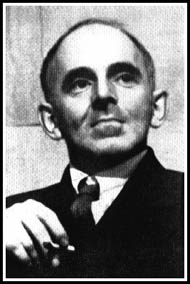 In the autumn of 1933 Osip Mandelstam (left) composed a seditious poem that sealed his fate. Regarded by many as the greatest Russian poet of the twentieth century, Mandelstam was steeped in the tropes and meters of classical verse. Many of his poems seemed to sustain an intimate conversation across space and time with Homer, Ovid, and Dante. So the poem composed that autumn in Moscow was an anomaly, overtly political and filled with Old Testament wrath. On a journey to Armenia in 1932, Mandelstam had seen firsthand the consequences of forced collectivization and deportation of millions of peasants — famine and death on a genocidal scale. Mandelstam blamed Josef Stalin for all of it. Although his poem did not name the Soviet leader, the identity of its protagonist was unmistakable:
In the autumn of 1933 Osip Mandelstam (left) composed a seditious poem that sealed his fate. Regarded by many as the greatest Russian poet of the twentieth century, Mandelstam was steeped in the tropes and meters of classical verse. Many of his poems seemed to sustain an intimate conversation across space and time with Homer, Ovid, and Dante. So the poem composed that autumn in Moscow was an anomaly, overtly political and filled with Old Testament wrath. On a journey to Armenia in 1932, Mandelstam had seen firsthand the consequences of forced collectivization and deportation of millions of peasants — famine and death on a genocidal scale. Mandelstam blamed Josef Stalin for all of it. Although his poem did not name the Soviet leader, the identity of its protagonist was unmistakable:
All we hear is the Kremlin mountaineer,
The murderer and peasant-slayer.His fingers are fat as grubs
And the words, final as lead weights, fall from his lips [1]
Mandelstam knew the poem would never be published in his lifetime. He never wrote it down on paper. He recited it aloud to a handful of his closest friends. Some who heard the poem were horrified by the risk it took; they urged Mandelstam to forget it. His wife Nadezhda Yakovlevna [2] remembered it three decades later as “a gesture, an act that flowed logically from the whole of his life and work… he did not want to die before stating in unambiguous terms what he thought about the things going on around us” (Hope Against Hope 161). All in all, only eleven people heard Mandelstam recite the poem, but that was enough for it to reach the ears of the Kremlin mountaineer. Genrikh Yagoda, head of the Soviet secret police at the time, knew the poem by heart. When he was safely beyond Stalin’s earshot, Yagoda would recite it with sadistic r?elish.
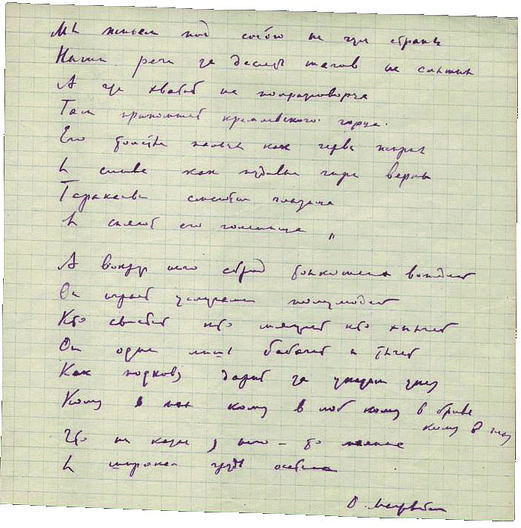 In May 1934 the secret police arrested Mandelstam. His interrogator at the Lubianka Prison in Moscow, confronting him with a faithful transcript of the poem (right), called it a “counter-revolutionary document without precedent” (Hope Against Hope 32). The ensuing cat-and-mouse game between Stalin and Mandelstam was played out in a time that has come to be known as the Great Terror. It typified how the dictator’s cult of personality destroyed the lives of countless people. The poet was not shot immediately. In an apparent act of the Great Leader’s benevolence, Mandelstam and his wife were sent into internal exile. They were reprieved for a time, then Mandelstam was arrested again and sentenced to forced labor. He died anonymously in a Siberian transit camp sometime in 1938.
In May 1934 the secret police arrested Mandelstam. His interrogator at the Lubianka Prison in Moscow, confronting him with a faithful transcript of the poem (right), called it a “counter-revolutionary document without precedent” (Hope Against Hope 32). The ensuing cat-and-mouse game between Stalin and Mandelstam was played out in a time that has come to be known as the Great Terror. It typified how the dictator’s cult of personality destroyed the lives of countless people. The poet was not shot immediately. In an apparent act of the Great Leader’s benevolence, Mandelstam and his wife were sent into internal exile. They were reprieved for a time, then Mandelstam was arrested again and sentenced to forced labor. He died anonymously in a Siberian transit camp sometime in 1938.
In such perilous times, according to Nadezhda Yakovlevna, nearly every Soviet citizen withdrew into a “protective coloring” of reticence and fear (Hope Against Hope 155). Even so, a remarkable assortment of people were drawn to the Mandelstams’ apartment in the autumn of 1933. Prominent among them was the poet Anna Akhmatova, whose lifelong friendship with Mandelstam and Nadezhda Yakovlevna would encompass most of the history of twentieth-century Russian literature. The biologist Boris Kuzin and writer Alexander Margulis, close friends also destined to die in Siberian labor camps, were frequent guests. Stage actor Vladimir Yakhontov and concert pianist Maria Yudina stopped by on occasion. So did the Greek and Hebrew scholar Vladimir Nilender and the psychologist Lev Vygotsky.
It is not known whether Vygotsky heard the “peasant-slayer” poem, although he certainly was familiar with Mandelstam’s other verse and critical writing. No
one has suggested that he could have been the informer in Mandelstam’s circle. When Nadezhda Yakovlevna wrote her memoirs — a monumental account of her life with Mandelstam and how she stubbornly survived the Stalinist era — she carefully weighed the evidence for and against those who might have betrayed her husband. In the end she refrained from naming the culprit. Vygotsky was never included in her list of suspects. In fact, in a thousand pages of memoir she mentioned Vygotsky only once, describing him as “a very intelligent psychologist (though somewhat hampered by the rationalism of the time)” (Hope Against Hope 223).
An equally oblique reference to Mandelstam appeared in the psychologist’s treatise Thought and Language less than a year after the Stalin poem entered the Terror’s oral tradition. Vygotsky’s book was published posthumously, for he died of tuberculosis at age 38 just a month after Mandelstam’s arrest. The final chapter of Thought and Language opens with an epigraph from another Mandelstam poem:
The word I forgot
Which once I wished to say
And voiceless thought
Returns to the shadow’s chamber. [3]
The lines come from “The Swallow,” a poem composed in 1920. In it Mandelstam evoked the fluttering of a blind swallow with amputated wings to suggest the restless movement of thoughts that do not become fully realized in words. In Thought and Language Vygotsky tried to elucidate the same process in psychological terms.
Mandelstam turned to the swallow several times in his poems. It represented more than an image of fitful, darting motion. As swallows appeared with the spring in northern Russia, their image in Mandelstam’s poetry also signaled regeneration and return to life. The swallow is a haunting metaphor, too, for the life of the mind shared by poet and psychologist in the shadow of Stalin’s Terror. That life of the mind continues to resonate back and forth in the writing of Osip Mandelstam and Lev Vygotsky. This essay is a search to recover something of that life, to understand how it remains both elusive and resilient.
2. The Work of Inner Speech
 In Russian the title of Vygotsky’s book is Myshlenie i Rech. This can be translated literally as “Thought and Speech,” but the word rech also connotes “language” and “discourse.” Similarly, the title of Vygotsky’s final chapter is “Myshlenie i Slovo.” One of the most profound words in the Russian language, slovo (“word”) can mean a single word or it can be a synecdoche for discourse, verbal expression, or the processes of language. Such problems with word-meanings are not merely a translator’s headache, according to psychologist Alex Kozulin; they go directly to the heart of Vygotsky’s theoretical concerns (Vygotsky’s Psychology 151-2). In reading Vygotsky’s and Mandelstam’s work, it must be remembered that “word” is not a thing, but a dynamic process. As psychologist A. A. Leontiev expressed it, “A word is the search for it” (qtd. in Zebroski 205). An alternative title for Vygotsky’s book might be “Thinking and Speaking.”
In Russian the title of Vygotsky’s book is Myshlenie i Rech. This can be translated literally as “Thought and Speech,” but the word rech also connotes “language” and “discourse.” Similarly, the title of Vygotsky’s final chapter is “Myshlenie i Slovo.” One of the most profound words in the Russian language, slovo (“word”) can mean a single word or it can be a synecdoche for discourse, verbal expression, or the processes of language. Such problems with word-meanings are not merely a translator’s headache, according to psychologist Alex Kozulin; they go directly to the heart of Vygotsky’s theoretical concerns (Vygotsky’s Psychology 151-2). In reading Vygotsky’s and Mandelstam’s work, it must be remembered that “word” is not a thing, but a dynamic process. As psychologist A. A. Leontiev expressed it, “A word is the search for it” (qtd. in Zebroski 205). An alternative title for Vygotsky’s book might be “Thinking and Speaking.”
In Thought and Language Vygotsky resisted splitting the meaning of words into semantic and phonetic categories. He favored compound phrases such as “meaningful speech” and “verbal thought” to identify what he considered to be amalgams of functions (212). He explained, “The relation of thought to word is not a thing but a process, a continual movement back and forth from thought to word and from word to thought” (218).
In the book’s final chapter Vygotsky conceptualized a series of functional planes in which this back and forth movement occurs:
External speech
Word-meanings
Inner speech
Thought
Vygotsky was a scientist, so he began with what he could observe on the plane of external or communicative speech. His analysis worked from the outermost toward the inner planes, but eventually he concluded that development from thought to language proceeded in the opposite direction.
The inward aspects of speech had been “as unknown to science as the other side of the moon” when Vygotsky began his studies (255). To probe inner processes, he turned to a type of behavior displayed in young children which the Swiss psychologist Jean Piaget termed “egocentric speech.” Vygotsky brought Piaget’s work to the attention of Soviet psychology in 1932 when he wrote an introduction for the Russian translation of Piaget’s The Language and Thought of the Child. Responding to Piaget’s theories became an impetus for writing Thought and Language (Kozulin, Vygotsky’s Psychology 176).
According to Piaget, a child uses egocentric speech without expectation of a response from others. This speech typically accompanies play and includes comments on the child’s thoughts and actions. It tends to be syntactically undifferentiated and is most common in children between the ages of three and five. Piaget considered egocentric speech to be a transitory, throw-away behavior, merely a verbal accompaniment to silent thought. In his view, it was not social and did not contribute to a child’s subsequent development of logical thinking (Kozulin, Vygotsky’s Psychology 174).
Vygotsky thought otherwise. He considered egocentric speech to be a rich transitional stage that led directly to the development of mature speech-for-others (external speech) and internalized speech-for-oneself (inner speech). Vygotsky devised a series of elegant experiments, widely replicated since the 1930s, to demonstrate how egocentric speech is involved in real problem-solving. In one experiment, a child’s play activity, such as drawing, was impeded by an external obstacle. Egocentric speech increased as the child confronted the obstacle. Vygotsky concluded that such obstacles stimulated the child to “think aloud” (Kozulin, Vygotsky’s Psychology 175).
Vygotsky (right) also theorized that egocentric speech remains connected to social communication because the child assumes that he or she is actually understood by others. In another series of experiments, Vygotsky placed the child in situations which undermined the illusion of understanding — playing in a room with children who were deaf, or with others removed at a great distance. Egocentric speech decreased in these situations. He concluded that egocentric speech requires the presumption of understanding by others. Subsequent research in the 1970s found that children produced more egocentric speech in the presence of adults whom they perceived as willing to help them (Kozulin, Vygotsky’s Psychology 175).
It should be noted here that deaf children were not limited to instrumental roles in Vygotsky’s experimental designs. Another of his research interests concerned the unique ways in which development proceeded for deaf and blind children. He was a founder of Moscow’s Institute of Defectology in 1924. Defectology was then the Soviet appellation for what is now known as special education. Despite the politically unpalatable sound of the term in English, Vygotsky’s approach to defectology emphasized the social consequences of disabilities, rather than an individual’s defects. As early as 1925, he asserted, “Blindness or deafness, as a psychological fact, is not at all a misfortune, but, as a social fact, it becomes such” (“Principles” 20). According to neurologist Oliver Sachs, “Vygotsky stressed the intactness rather than the deficits” of disabled children (xvii). He was one of the first psychologists to recognize the linguistic integrity of sign languages.
Egocentric speech tends to fade away in children beyond the age of seven, according to Vygotsky, but it does not fade completely. It becomes internalized as inner speech, or speech-for-oneself. By studying egocentric speech as it faded, or provoking its production under experimental conditions, Vygotsky used it as a window into the elusive processes of inner speech. Based on his observations, Vygotsky concluded in Thought and Language that inner speech followed its own “syntax of word meanings” (222). He characterized this syntax as abbreviated, predicated, and saturated with sense. Inner speech abbreviates word-meanings by dropping the subject of sentences while preserving the predicates. A single word becomes saturated with meaning in inner speech. “To unfold it into overt speech,” Vygotsky explained, “one would need a multitude of words” (243). Moving from inner speech to external speech is not simply the vocalization of silent speech. It requires the transformation of abbreviated, predicated forms into other, more syntactically deployed forms (248).
Vygotsky considered writing to be a form of speech because it involved processes connecting thought to language. While inner speech is the most condensed type of speech, writing is the most elaborate. It uses the most words to convey a meaning to an absent reader, because only words are available to it. Gesture, tone, and context are not available to help convey meaning (242). Complicated forms, in turn, require complex processes such as writing multiple drafts. “The evolution from the draft to the final copy reflects our mental process,” Vygotsky wrote in a sentence that became a hook for contemporary teachers of writing (242-43). He considered the work of inner speech to be a kind of mental draft for both written and oral speech, because planning occurs even when a draft is not written (243).
Inner speech is not the antecedent of external speech, nor is it merely the reproduction of external speech in memory. In differentiating them, Vygotsky insisted that inner and external speech operate in conjunction. As external speech is the materialization of thought into words, inner speech is the sublimation of words into thought (226). “In external speech thought is embodied in words; in inner speech words die as they bring forth thought,” Vygotsky wrote (248). Evoking the image of Mandelstam’s blind swallow, he described inner speech as “a dynamic, shifting, unstable thing, fluttering between word and thought” (249).
A chance encounter with Osip Mandelstam on the streets of Voronezh, the provincial city where he was exiled in 1934-36, would have revealed some of the behaviors Vygotsky observed in his experiments. Mandelstam composed verse in the workshop of inner speech. The best indication that he actually was writing was the silent movement of his lips as he walked about. Even with his longer prose works, he seldom wrote directly on paper. Mandelstam evinced a blithe indifference to written texts not uncommon among Russians in the Stalin era. Nadezhda Yakovlevna would write down his daily output of words at the end of the walk. He trusted her, Akhmatova, and the secret police to keep track of his manuscripts. Nadezhda Yakovlevna knew Mandelstam’s work intimately, and her memoirs are filled with insight about his writing process. She evidently read Vygotsky’s book in the 1960s, for she mentions it (mistakenly reversing the title as Language and Thought) in her sole reference to the psychologist. In Hope Against Hope she quotes “The Swallow” and describes Mandelstam’s composition process in terms that parallel Vygotsky’s concept of inner speech:
The process of composing verse also involves the recollection of something that has never before been said, and the search for lost words is an attempt to remember what is still to be brought into being (“I have forgotten the word I wished to say, like a blind swallow it will return to the abode of shadows.” ) This requires great concentration, till whatever has been forgotten suddenly flashes into the mind. In the first stage the lips move soundlessly, then they begin to whisper and at last the inner music resolves itself into units of meaning: the recollection is developed like the image on a photographic plate. (187)
3. Subtext and Secret Writing
As Vygotsky probed deeper into the inner processes of thought and language, he reached motive. “Thought is not begotten by thought,” he wrote. “It is engendered by motivation, … by our desires and needs, our interests and emotions. Behind every thought there is an affective-volitional tendency” (252). Vygotsky posited motive on the deepest, most inward plane in his model. Beginning with motive, moving out from it, the model looks like this:
Motive
Thought
Inner speech
Word-meanings
External speech
To understand another’s words, Vygotsky argued, it is not enough to understand his or her thought; we must also understand the motive behind the thought. “No psychological analysis of an utterance is complete until that plane is reached” (253).
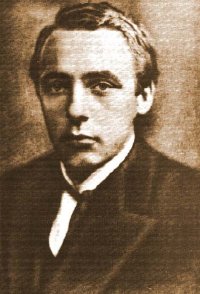 In the final pages of Thought and Language, Vygotsky turned increasingly to examples from Russian literature to illustrate the abstractions in his theoretical model. He recreated a courtship dialogue between Levin and Kitty in Tolstoy’s Anna Karenina to show how interlocutors who know one another can use condensed external speech that approaches the abbreviation of inner speech (237-8). He quoted Dostoevsky — when a thought miscarries it “will not enter words” — for an example of the commonplace literary lament decrying the difficulty of expressing thoughts in words (249). To suggest how we continually cut new pathways from thought to words, Vygotsky cited the futurist poet Velemir Khlebnikov, who compared the writing of his experimental poems to building roads across the mountains to connect once isolated valleys (251).
In the final pages of Thought and Language, Vygotsky turned increasingly to examples from Russian literature to illustrate the abstractions in his theoretical model. He recreated a courtship dialogue between Levin and Kitty in Tolstoy’s Anna Karenina to show how interlocutors who know one another can use condensed external speech that approaches the abbreviation of inner speech (237-8). He quoted Dostoevsky — when a thought miscarries it “will not enter words” — for an example of the commonplace literary lament decrying the difficulty of expressing thoughts in words (249). To suggest how we continually cut new pathways from thought to words, Vygotsky cited the futurist poet Velemir Khlebnikov, who compared the writing of his experimental poems to building roads across the mountains to connect once isolated valleys (251).
As Stalin tightened his grip on Soviet intellectual life in the 1930s, what was permitted in literary citations changed on a daily basis. Vygotsky was relatively safe to cite Tolstoy and Dostoevsky. Their writings held official favor to the extent they criticized life’s prevailing order in Czarist times, but even the nineteenth-century masters could run afoul of the censors. A complete scholarly edition of Dostoevsky’s works, for example, could not be published in Stalin’s lifetime (N. Mandelstam, Hope Abandoned 146). Citing contemporary writers became even more dubious. Khlebnikov was recognized as an iconoclastic leader in the Futurist movement in Russian poetry and was associated with poets Sergei Yesenin and Vladimir Mayakovsky. Darlings of the Revolution in its early years, a time known as the Great Experiment, Yesenin and Mayakovsky eventually committed suicide as Stalin consolidated power. Khlebnikov barely outlived the Revolution. Psychologically fragile, abstractly withdrawn from the grimness of Soviet life, Khlebnikov was expelled from Moscow as a vagrant in 1922. He died in the provinces not long thereafter, homeless and malnourished (Hope Abandoned 89-97).
As Vygotsky elaborated the concept of motive, the literary citations skated on politically thin ice. “Every sentence that we say in real life has some kind of subtext, a thought hidden behind it,” Vygotsky asserted (250). He described how the director Konstantin Stanislavsky worked out the problem of subtexts with actors in the Moscow Art Theater. Stanislavsky was a safe citation then, but those that followed were anathema to Stalin’s regime — Nikolai Gumilev and Osip Mandelstam. From Gumilev’s poem “Word” Vygotsky quoted: “like bees in a deserted hive/The dead words have a rotten smell” (255). Then he evoked another image from “The Swallow”: “thought that fails to realize itself in words,” Vygotsky said, “remains a ‘Stygian shadow'” (255).
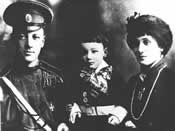 Russian readers (and Stalin’s censors) surely would have noted the coupling of these poets in Vygotsky’s text. Their association was no accident. Together with Anna Akhmatova, Gumilev (left) and Mandelstam were known as proponents of Acmeism, a short-lived literary movement suppressed after the Revolution. Mandelstam defined Acmeism as “nostalgia for world culture” (qtd. in N. Mandelstam, Hope Against Hope 246). It was an eclectic humanism regarded as bourgeois and old-fashioned by ideologues of the new Soviet era. Gumilev was shot for “counter-revolutionary activities” in 1921, presumably at Lenin’s orders. His execution foreshadowed the brutal purges to come. Akhmatova, who had been married to Gumilev before the Revolution, was castigated famously as “half nun, half harlot” (Reeder 154). As the Great Experiment faltered in the 1920s, neither Akhmatova nor Mandelstam were permitted to publish new poetry.
Russian readers (and Stalin’s censors) surely would have noted the coupling of these poets in Vygotsky’s text. Their association was no accident. Together with Anna Akhmatova, Gumilev (left) and Mandelstam were known as proponents of Acmeism, a short-lived literary movement suppressed after the Revolution. Mandelstam defined Acmeism as “nostalgia for world culture” (qtd. in N. Mandelstam, Hope Against Hope 246). It was an eclectic humanism regarded as bourgeois and old-fashioned by ideologues of the new Soviet era. Gumilev was shot for “counter-revolutionary activities” in 1921, presumably at Lenin’s orders. His execution foreshadowed the brutal purges to come. Akhmatova, who had been married to Gumilev before the Revolution, was castigated famously as “half nun, half harlot” (Reeder 154). As the Great Experiment faltered in the 1920s, neither Akhmatova nor Mandelstam were permitted to publish new poetry.
By including the words of proscribed writers in his text, Vygotsky employed a literary device known in Russian as tainopis or “secret writing.” More than an allusion, tainopis is an oblique but conscious citation of a writer who cannot be named directly for political reasons. Akhmatova biographer Roberta Reeder described the device as “enforced subtlety” (158). Mandelstam signaled its necessity in The Noise of Time when he hinted at an “interlinear translation” of the 1905 revolution (103). Akhmatova used tainopis extensively in poems written after 1925, including her epic “Poem without a Hero.” In a critical essay written in the 1930s, itself a kind of secret writing, Akhmatova described how Pushkin used tainopis in the nineteenth century (Reeder 226). The long tradition of speaking obliquely about injustice and oppression may be as old as the Russian language itself.
Just who was responsible for enforcing the subtlety of secret writing? This stubborn enigma lurks beneath the surface of many written texts from the Soviet era. As with the better-known problem of identifying the author of Marxism and the Philosophy of Language — was it V. N. Volosinov, whose name was printed on the book’s 1928 title page, or Mikhail Bakhtin, who continued to deny its authorship on his deathbed fifty years later? — it is difficult to know whether the furtive presence of Gumilev and Mandelstam in Thought and Language represents state censorship or self-censorship. Their quotations are not included in the book’s 1962 English translation, although the Mandelstam epigraph is retained. The editor-translators of the 1962 edition noted, if faintly, that their “straightforward exposition” of Vygotsky’s complex text could be viewed as an abridgement (Hanfmann and Vakar xii). They may be responsible for omitting Gumilev and Mandelstam, but it is more likely that the omission began in the book’s 1956 Russian edition. Gumilev and Mandelstam remained on the Soviet blacklist at the time. Working with the first Russian edition published in 1934, Kozulin restored the quotations to his unabridged 1986 translation. It is unclear whether the poets’ names appear there as Vygotsky’s or Kozulin’s glosses.
4. The Living Word
The abridged translation of Thought and Language also omitted passages which the translators considered obscure, overly philosophical, and extraneous to the book’s scientific arguments. In the unabridged translation Kozulin noted, without elaboration, that some of Vygotsky’s conclusions were influenced by Mandelstam’s essay “On the Nature of the Word” (273). A seminal expression of Mandelstam’s poetics and theory of language, the essay originated in conditions that easily could have consigned it to oblivion. That Vygotsky had access to it at all suggests that Mandelstam placed it directly in his hands.
“On the Nature of the Word” was written in 1921 in the provincial city of Kharkov, where the Mandelstams found refuge for a time from the chaos of the Russian civil war. The essay was commissioned by Rakovskaya, sister of the premier of the Ukraine. With such a high-ranking party official as her patron, Rakovskaya was safe to append an epigraph at the beginning of the essay — lines from the same Gumilev poem which Vygotsky quoted over a decade later. Gumilev’s poem had been published not long before his execution in 1921. The essay was published a year later as a chapbook with a limited press run. When it was published again in a 1928 prose collection, the Gumilev epigraph was deleted along with the essay’s final section. The abridgement may have resulted from Mandelstam’s own self-censorship (Harris 308-12). When Mandelstam was arrested in 1934, his only copy of the original essay was confiscated by the secret police.
According to Nadezhda Yakovlevna, Mandelstam was neutral in 1922 about adding Gumilev’s lines to his essay. She endorsed their restoration to the text forty years later (Hope Abandoned 74). The lines signal not only the essay’s theme, but also its source. Here is the 1922 Gumilev epigraph in full, from Mandelstam’s essay:
We have forgotten that the word alone
Shone radiant over the troubled earth,
And that in the Gospel of St. John
It’s written that the word is God.
But we have limited its range
To the paltry boundaries of this world,
And like the dead bees in an empty hive
Dead words emit a foul odor. (72-73)
At the heart of Mandelstam’s essay is an expression of Russian nominalism, a belief in the reality of the living word. Gumilev’s poem traces this nominalism to the Bible, but its origin should be understood more accurately as the Greek language into which the Bible was translated. Mandelstam considered Russian to be a Hellenic language in its sense of the word incarnate as flesh and action. The language’s boundless, primal energy could not be proscribed by the state’s or the church’s linguistic forms. “The life of the Russian language in Russian historical reality outweighs all other facts in the abundance of its properties, in the abundance of its being,” Mandelstam wrote. “Such abundance appears to all the other phenomena of Russian life as but an inaccessible outer limit” (75). Throughout the final chapter of Thought and Language, Vygotsky emphasizes the same living, active nature of the word. “It is not merely the content of a word that changes, but the way in which reality is generalized and reflected in a word” (213). “Thought is not merely expressed in words; it comes into existence through them” (218). By quoting Gumilev and Mandelstam, Vygotsky invoked a similar Russian nominalism, although he framed it in psychological rather than Christian or Hellenic terms. “The relation between thought and word is a living process; thought is born through words. A word devoid of thought is a dead thing” (255).
![Khlebnikov"s Zangezi A page from Velemir Khlebnikov’s book Zangezi (1922), an ecstatic drama written partly in invented languages of gods and birds.” [Source: Wikipedia]](../../wp-content/uploads/2010/01/velemir_Khlebnikov_zangezi_1922.gif) Mandelstam believed that the Russian language “is not merely a door into history, but is history itself” (76). The language preserved a continuity stretching from the oldest Russian folk epics to the Futurist experiments (left) of Velemir Khlebnikov. For Mandelstam, Khlebnikov’s burrowing into the soil of Russian word roots, “into an etymological night,” renewed the life of word and language (75). Mandelstam and Khlebnikov often are held up as antagonists representing opposing movements in Russian poetry. The Acmeists wanted to preserve the past; the Futurists wanted to blow it up. Their poems are vastly different in form and tone, but Mandelstam and Khlebnikov shared a similar attraction to the nominalism of the living word. A few months after writing “On the Nature of the Word,” the Mandelstams shared a cramped apartment with Khlebnikov before the latter’s expulsion from Moscow, befriending him as a kind of helpless yet holy fool (Hope Abandoned 92).
Mandelstam believed that the Russian language “is not merely a door into history, but is history itself” (76). The language preserved a continuity stretching from the oldest Russian folk epics to the Futurist experiments (left) of Velemir Khlebnikov. For Mandelstam, Khlebnikov’s burrowing into the soil of Russian word roots, “into an etymological night,” renewed the life of word and language (75). Mandelstam and Khlebnikov often are held up as antagonists representing opposing movements in Russian poetry. The Acmeists wanted to preserve the past; the Futurists wanted to blow it up. Their poems are vastly different in form and tone, but Mandelstam and Khlebnikov shared a similar attraction to the nominalism of the living word. A few months after writing “On the Nature of the Word,” the Mandelstams shared a cramped apartment with Khlebnikov before the latter’s expulsion from Moscow, befriending him as a kind of helpless yet holy fool (Hope Abandoned 92).
To be cut off from the living language — Mandelstam called this “excommunication from the word” — was to be cut off from history itself, to plunge over the brink into nihilism (76-77). He insisted that the inherent unity of the language, even as it evolved and changed forms, was preserved across historical time. He rejected the “theory of progress” which maintained that recent literary forms were necessarily better than old ones (74). On its surface Mandelstam’s essay appears to be a polemic about the supersession of obscure literary movements (Acmeism, Futurism, Formalism, Symbolism). In the 1920s, debate about the “theory of progress” was played out at the level of bureaucratic maneuvering among rival literary factions, but by the time of the Terror it had become a matter of life and death for Soviet intellectuals. They were expected to espouse the historical determinism of Marxist-Leninist doctrine, which posited an unquestionable faith in the new Soviet order. Stalin’s regime did everything in its power to excommunicate gadflies of world culture such as Mandelstam.
Vygotsky’s own approach to Marxist doctrine was singularly contradictory, according to Kozulin. Vygotsky took Marx’s writings “absolutely seriously” as a philosophy and practical method for analyzing the political economy of the nineteenth century. He treated Marx as a social theorist on a par with Hegel and the French sociologist Emile Durkheim. But he did not embrace Marxism as an ideology, and he rejected dialectical materialism as a basis for psychological theory (Kozulin, Utopia 116). Vygotsky emphasized attention to concrete social conditions and historical development throughout his writings. At the end of Thought and Language he asserted, “Only a historical theory of inner speech can deal with this immense and complex problem” (255). To many a Western ear, such a theory sounds like Marxist doctrine. However, Vygotsky’s uses of history and culture were closer to Mandelstam’s boundless abundance than to Stalin’s narrow strictures.
The word “development” must have sparked heated debates between psychologist and poet in Mandelstam’s apartment in 1933. If Vygotsky had a consistent ideology, it was encompassed by the concept of development. Along with Piaget, he is now regarded by many as a founder of developmental psychology. Mandelstam, on the other hand, abhorred the word. He joked seditiously that Communist Party operatchiks were “developments with a beard” (Volkov 212). Theirs would have been debates over terms, not principles. Mandelstam read widely in biology and the sciences, and both his poetry and critical prose are suffused with images evoking the growth and evolution of organic forms. Near the end of “On the Nature of the Word” he described a “humanization” of psychology and science that could look beyond the objects of the external world to explore more fully the processes of human consciousness (82). Vygotsky sketched, but could not complete, a similar resolution of philosophy and science at the end of Thought and Language.
“Consciousness is reflected in a word as the sun in a drop of water,” he wrote in the book’s final paragraph. “A word relates to consciousness as a living cell relates to a whole organism, as an atom relates to the universe. A word is a microcosm of human consciousness” (256).
At the end of “On the Nature of the Word” Mandelstam expressed a similar belief in the living word’s capacity to encapsulate, transmit, and renew consciousness across space and time:
The age will shout itself out, culture will fall asleep, and the people will be reborn, having given their utmost to the new social class; and this current will draw the fragile ship of the human word away with it, out into the open sea of the future where there is no sympathetic understanding, where cheerless commentary will replace the fresh wind of contemporary enmity and sympathy. How can one equip the ship for its distant voyage, without furnishing it with all the necessities for so foreign and cherished a reader? Once more I shall liken a poem to an Egyptian funerary ship. In that ship everything is provided for life, nothing is forgotten. (83)
5. The Renewal of Motive
Early in my study of Lev Vygotsky’s work I asked an experimental psychologist, an eminent authority on the evolution of the mammalian brain, what he knew about Vygotsky. He was working on sabbatical in London at the time, so our email conversation had the abbreviated quality of inner speech. He explained that he had looked at Thought and Language after the first English translation appeared in 1962. He skimmed the book as a busy scholar would, just to stay abreast of current developments at the margins of his field, and found little that was relevant to him. Despite the translators’ efforts to expurgate the book’s polemics, he was put off by its Communist overtones. He read it at the height of the Cold War and could not readjust the lens of political ideology. His assessment of Lev Vygotsky ended succinctly: “A man of his times — feet of clay.”
That image haunted me. I could not reconcile it with the author who dared to quote Osip Mandelstam on the eve of the Great Terror. Seeking to understand “feet of clay” is what led me deeper into Vygotsky’s and Mandelstam’s lives. I encountered it again in “On the Nature of the Word,” where Mandelstam noted that the Symbolist poets erected a colossal edifice of empty words while “standing on clay feet” (81). Eventually I traced the allusion back to Dante, Mandelstam’s beloved interlocutor across space and time. Mandelstam’s final prose work, unpublished until 1967, was “Conversation about Dante” (Critical Prose 252-290). He so loved the Florentine poet that he carried a pocket edition of Dante wherever he went in the 1930s, so he would have it if arrested. Mandelstam carried Dante twice into prison.
Mandelstam was anguished for a time in the 1920s when he could not write poetry. According to Nadezhda Yakovlevna, this was not simply a dry spell, but a deep inner conflict over motive. Mandelstam had turned to hack work in provincial newspapers in order to make a living, and he tried without much success to make his ideas fit the times’ popular dogma. He even criticized Akhmatova, his closest friend and soul-mate, in a newspaper review. As a result, his muse left him and would not return until he recognized that he could not remain silent about Stalinist oppression (Hope Against Hope 173). His late poetry revealed aspects of the inner speech where it was composed and preserved. According to poet Joseph Brodsky,
His became a poetry of high velocity and exposed nerves, with numerous leaps over the self-evident with somewhat abbreviated syntax. And yet in this way it became more a song than ever before, not a bardlike but a birdlike song, with its sharp, unpredictable turns and pitches, something like a goldfinch tremolo. (134)
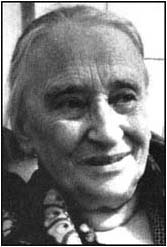 After his first arrest and exile in Voronezh, Mandelstam wrote a cycle of poems comparing his need for self-expression, whether he was caged or free, with that of a goldfinch. About the same time, he wrote another, even more anomalous poem about Stalin. This one glorified the Great Leader, and it was Mandelstam’s only attempt at recapitulation. It could not save him, but in the end it may have spared Nadezhda Yakovlevna’s life (left; Hope Against Hope 103).
After his first arrest and exile in Voronezh, Mandelstam wrote a cycle of poems comparing his need for self-expression, whether he was caged or free, with that of a goldfinch. About the same time, he wrote another, even more anomalous poem about Stalin. This one glorified the Great Leader, and it was Mandelstam’s only attempt at recapitulation. It could not save him, but in the end it may have spared Nadezhda Yakovlevna’s life (left; Hope Against Hope 103).
Before his death in 1934, Vygotsky faced a similar conflict between motive and recapitulation. Soviet psychologists whose work related to researchers in the West, as Vygotsky’s did with Piaget and others, were condemned for not following the philosophical authority of Marxism-Leninism. There is scant documentary evidence to show how Vygotsky and his research group responded to the ideological pressure, according to Kozulin. Vygotsky’s colleague, Alexander Luria, was forced to publish a renunciation of his earlier interest in Freudian psychoanalysis. Notes prepared by Vygotsky in advance of an ideological “discussion” of his theories in 1933-34, published for the first time only in the 1980s, suggest that he did not intend to recant. Another colleague who survived the 1930s, Bluma Zeigarnik, claimed in the 1980s that Vygotsky was so distraught over being misunderstood that he hastened his death from tuberculosis. In the end, Kozulin writes, Vygotsky “seemed to respect the wisdom of the disgraced poet Mandelstam much more than all the volumes of his Marxist contemporaries” (Vygotsky’s Psychology 240-243).
The best evidence for this is the “Swallow” epigraph in Thought and Language. Preparing the book’s manuscript was one of Vygotsky’s final acts before his death. Inserting Mandelstam’s words in his text became a gesture of resistance like Mandelstam’s “peasant-slayer” poem. More than thirty years would pass before another Mandelstam quotation appeared in a Soviet book. The quotation was neither an accident nor an afterthought, but an indication of the motive that prompted Vygotsky’s thinking. The subtext I hear in it is this: words that are cut off from motive are dead things; words that return to motive, like the fluttering swallow, are renewed and can come alive again. Like the search for a word, a back-and-forth movement through the planes of thought and language, the renewal of motive is a continual process.
Like many Russian Jews born amid the pogroms at the end of the nineteenth century, Mandelstam and Vygotsky embraced the 1917 Revolution for its promise of ending Russia’s entrenched anti-Semitism. Each lost his enthusiasm for the Great Experiment as it convulsed into the Great Terror. Both men drew deeply on cultural traditions that could not be confined by national or ideological boundaries. Had they somehow survived the 1930s, Vygotsky and Mandelstam would have faced repeated Nazi and Stalinist threats for being “cosmopolitans” — a sinister code-word for “Jews.” Despite the harshest efforts at authoritarian control, each of them refused to surrender the motive of his own thoughts. Grounded in history, both believed their words would survive the material conditions of their age. Like Egyptian funerary ships, their words were preserved against decades of official proscription and silence until the words could come alive again in the minds and language of others. Osip Mandelstam and Lev Vygotsky were both men of their times, and they surely stood on feet of brass, not clay.
Notes
[1] These stanzas come from the first version of the poem. A slightly sanitized version appears below. Both are quoted in N. Mandelstam, Hope Against
Hope 13.
We live, deaf to the land beneath us,
Ten steps away no one hears our speeches,But where there’s so much as half a conversation
The Kremlin’s mountaineer will get his mention.His fingers are fat as grubs
And the words, final as lead weights, fall from his lips,His cockroach whiskers leer
And his boot tops gleam.Around him a rabble of thin-necked leaders -
Fawning half-men for him to play with.They whinny, purr or whine
As he prates and points a finger,One by one forging his laws, to be flung
Like horseshoes at the head the eyes or the groin.And every killing is a treat
For the broad-chested Ossette. [Returnto text]
[2] To avoid confusion, I will refer to Osip Mandelstam by his last name and to his wife by her first name and patronymic, Nadezhda Yakovlevna, which is a courteous form of address in Russian. Nadezhda means “hope” in Russian, a word-play incorporated into the English titles of her memoirs, Hope Against Hope and Hope Abandoned. [Returnto text]
[3] All quotations from Thought and Language come from the 1986 translation by Alex Kozulin, unless otherwise noted. Kozulin also translated the Mandelstam epigraph (210). The complete text of Mandelstam’s poem “The Swallow” appears below. It comes from Complete Poetry of Osip Emilevich Mandelstam (110).
What had I wanted to say? I forgot.
The blind swallow flies back to Pluto’s palace
on amputated wings, and plays with transparent souls.
Night songs sing in unconsciousness.But no birds sing. Flowering evergreens aren’t in flower.
Night’s horses have transparent manes.
An empty canoe drifts in the dry river.
The grasshoppers’ password is: be unconscious.Growing, slowly, like a tent, a temple,
now throwing itself to the side, suddenly, like mad
Antigone, now like a dead swallow throwing itself
at your feet with Stygian tenderness and a green branch.Oh, if I could give back the shame of sensate
fingers, the shameful joy of knowing.
Niobes’ tears terrify me,
and the fog, the ringing, the gaping opening.And men can love, men can know,
even sound pours itself into their fingers,
but I forgot what I want to say
and the unbodied thought goes back to the palace of ghosts.That transparent thought keeps repeating the wrong thing,
keeps fluttering like a swallow, my friend, Antigone. . .
and echoes of Stygian ringing
burn on her lips, black like ice. [Returnto text]
Works Cited
Brodsky, Joseph. Less Than One: Selected Essays. New York: Farrar, Straus and Giroux,
1986.
Hanfmann, Eugenia and Gertrude Vakar. Translators’ Preface. In Vygotsky, Lev. Thought and Language. Ed. and trans. Eugenia Hanfmann and Gertrude Vakar. Cambridge, MA: M.I.T. Press, 1962, xi-xiii.
Harris, Jane Gary. Notes. In Mandelstam, Osip. The Complete Critical Prose. Ed. Jane Gary
Harris. Trans. Jane Gary Harris and Constance Link. Dana Point, CA: Ardis, 1997. 291-349.
Kozulin, Alex. Notes. In Vygotsky, Lev. Thought and Language. Ed. and trans. Alex Kozulin. Cambridge, MA: M.I.T. Press, 1986. 257-279.
—. Psychology in Utopia. Cambridge, MA: M.I.T. Press, 1984.
—. Vygotsky in Context. In Vygotsky, Lev. Thought and Language. Ed. and trans. Alex Kozulin.
Cambridge, MA: M.I.T. Press, 1986. i-lvi.
—. Vygotsky’s Psychology: A Biography of Ideas. Cambridge, MA: Harvard University Press, 1990.
Mandelstam, Nadezhda. Hope Abandoned. Trans. Max Hayward. New York: Atheneum, 1974.
—. Hope Against Hope: A Memoir. Trans. Max Hayward. Introduction. By Clarence Brown. New York: Atheneum, 1970.
Mandelstam, Osip. Complete Poetry of Osip Emilevich Mandelstam. Trans. Burton Raffel and Alla Burago. Introduction and notes. By Sidney Monas. Albany: State University of New York Press, 1973.
—. The Noise of Time. In The Prose of Osip Mandelstam. Trans. Clarence Brown. Princeton, NJ: Princeton University Press, 1965. 67-132.
—. On the Nature of the Word. In Collected Critical Prose of Osip Mandelstam. Ed. Jane Garry Harris. Trans. Jane Gary Harris and Constance Link. Ann Arbor: Ardis, 1996. 72-85.
Reeder, Roberta. Anna Akhmatova: Poet and Prophet. New York: St. Martin’s, 1994.
Volkov, Solomon. Conversations with Joseph Brodsky: A Poet’s Journey Through the Twentieth Century. Trans. Marian Schwartz. New York: Free Press, 1999.
Voloshinov, V. N. Marxism and the Philosophy of Language. Trans. Ladislav Matejka and I. R. Titunik. Cambridge, MA: Harvard University Press, 1986.
Vygotsky, Lev. Principles of Social Education for Deaf and Dumb Children in Russia. In The Vygotsky Reader. Eds. R. van der Veer and J. Valsiner. Cambridge, MA: M.I.T. Press, 1994. 19-26.
—. Thought and Language. Eds. and trans. Eugenia Hanfmann and Gertrude Vakar. Cambridge, MA:
M.I.T. Press, 1962.
—. Thought and Language. Ed. and trans. Alex Kozulin. Cambridge, MA: M.I.T. Press, 1986.
Zebroski, James T. Thinking through Theory: Vygotskian Perspectives on the Teaching of Writing. Portsmouth, NH: Boynton/Cook, 1994.
* * * * *
© Mark Willis.This work is published here under a Creative Commons 3.0 license - attribution, non-commercial, share alike.
 A Word Is The Search For It on streetspirit.ir (Persian translation):
A Word Is The Search For It on streetspirit.ir (Persian translation):
Part I: In the Shadow of Stalin’s Terror
Part II: The Work of Inner Speech
Part III: Subtext and Secret Writing
Part IV: The Living Word
Part V: The Renewal of Motive
![gustave_caillebotte_paris_street_rainy_day Gustave Caillebotte. Paris Street, Rainy Day (La Place de l’Europe, temps de pluie). 1877. Oil on canvas. Art Institute of Chicago. [Source: Wikimedia Commons]](../../wp-content/uploads/2009/02/gustave_caillebotte_paris_street_rainy_day_1877_wiki.jpg)
![Fog at Isle Royale [Source: wildmengoneborneo.com] Fog at Isle Royale [Source: wildmengoneborneo.com]](../../wp-content/uploads/2008/04/isle_royale_fog.jpg)
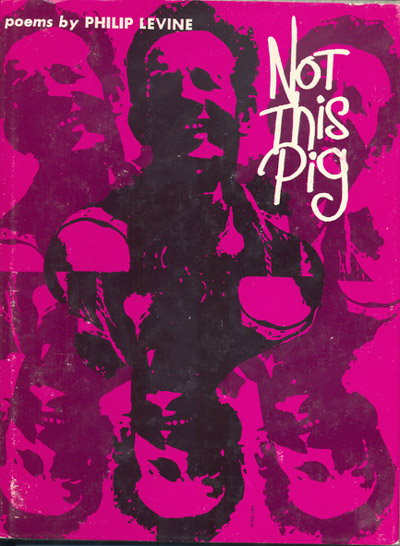 If there is an emerging genetic underclass, I could run for class president or class clown. Read more in
If there is an emerging genetic underclass, I could run for class president or class clown. Read more in 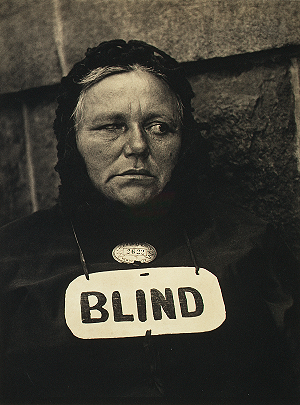
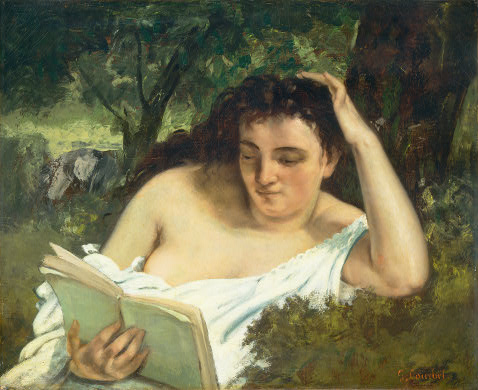
Pingback: Vygotsky & Bakhtin, Madelstam & Walter Benjamin - a blind flaneur
Pingback: My Gift For Tom Paine’s Birthday - a blind flaneur
Pingback: A Word is the Search for It, part 1: In the Shadow of Stalin’s Terror - a blind flaneur
Pingback: Iran Blocks Travel By Poet Simin Behbahani - a blind flaneur
Pingback: Oda Mandeljštamu - Odiseja